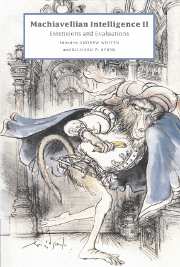Book contents
- Frontmatter
- Contents
- Contributors
- Preface
- 1 Machiavellian intelligence
- 2 Friendships, alliances, reciprocity and repair
- 3 Why Machiavellian intelligence may not be Machiavellian
- 4 Social intelligence and success: Don't be too clever in order to be smart
- 5 Minding the behaviour of deception
- 6 The Machiavellian mindreader
- 7 Exploiting the expertise of others
- 8 Primates' knowledge of their natural habitat: As indicated in foraging
- 9 Evolution of the social brain
- 10 The modulatory of social intelligence
- 11 The Technical Intelligence hypothesis: An additional evolutionary stimulus to intelligence?
- 12 Protean primates: The evolution of adaptive unpredictability in competition and courtship
- 13 Egalitarian behaviour and the evolution of political intelligence
- 14 Social intelligence and language: Another Rubicon
- Index
10 - The modulatory of social intelligence
Published online by Cambridge University Press: 23 November 2009
- Frontmatter
- Contents
- Contributors
- Preface
- 1 Machiavellian intelligence
- 2 Friendships, alliances, reciprocity and repair
- 3 Why Machiavellian intelligence may not be Machiavellian
- 4 Social intelligence and success: Don't be too clever in order to be smart
- 5 Minding the behaviour of deception
- 6 The Machiavellian mindreader
- 7 Exploiting the expertise of others
- 8 Primates' knowledge of their natural habitat: As indicated in foraging
- 9 Evolution of the social brain
- 10 The modulatory of social intelligence
- 11 The Technical Intelligence hypothesis: An additional evolutionary stimulus to intelligence?
- 12 Protean primates: The evolution of adaptive unpredictability in competition and courtship
- 13 Egalitarian behaviour and the evolution of political intelligence
- 14 Social intelligence and language: Another Rubicon
- Index
Summary
In a ‘protected threat’, a baboon induces a dominant member of its group to attack a third one. The baboon appeases the dominant member whom it uses as a tool to threaten the target and manoeuvres to prevent the target from doing the same (Kummer, 1988). This ‘social tool use’ is mastered by baboons at puberty, whereas chimpanzees are adult before they learn to use a stone as a tool for cracking hard nuts (Boesch & Boesch, 1984). Primates appear to manipulate social objects with more ease and sophistication than physical tools.
Observations such as these have suggested that primate intelligence is designed primarily for the social rather than the physical and have led to the Machiavellian intelligence hypothesis (Whiten & Byrne, 1988a) or social intelligence hypothesis (Kummer et al., 1997). The term Machiavellian intelligence emphasises the besting of rivals for personal gain over co-operation, whereas the term social intelligence (which is the more general term) is neutral on the balance between exploitation and co operation.
The social intelligence hypothesis is both stimulating and vague. It is stimulating because it reminds us that whenever psychologists study intelligence and learning in humans or animals, it is almost invariably about inanimate objects: symbols, sticks and bananas. It is vague because the nature of the intelligence it invokes is largely unclear, and as a consequence, the mechanisms of social intelligence have not yet been specified. This combination of exciting and imprecise should be an alarming signal. The social intelligence hypothesis has the seductive power of a political party with no precise programme that allows everyone unhappy with the established system to project his or her own values on it.
- Type
- Chapter
- Information
- Machiavellian Intelligence IIExtensions and Evaluations, pp. 264 - 288Publisher: Cambridge University PressPrint publication year: 1997
- 27
- Cited by



